Category: Research
Digital Futures Postdoc Fellowship
Last year I was awarded a digital futures postdoctoral fellow position, which due to parental leave for my second child, I will begin on August 15th, 2023 at Stockholm University. I will be working with Airi Lampinen (Stockholm University) and Meike Schalk (KTH Royal Institute of Technology) on the project Children and sustainability: Designing digital tools for collaborative survival.
About the project
My research will investigate children and digitalization for more sustainable futures. It draws upon a feminist ethics of care and more-than-human theories of collaborative survival to examine new roles of technology in and for multi-species flourishing. This will be done through design-based activities (i.e. research-through-design) that will be situated around topics such as human-waste relations, local ecosystems, and nature appreciation.
Background
This research is motivated by a concern for a damaged environment and is oriented towards children as inhabitants and caretakers of its future. It is significant for the following reasons. Firstly, its focus on children is significant in considering new paradigms of digital tools and the long-term role of digitalization in everyday life. Secondly, its relational grounding within theories of care provides a lens to consider humans as interconnected with non-humans, which is important in developing understandings of designing with distributed and networked digital materials. Thirdly, its emphasis on nature as critical to the health and wellbeing of all species situates an important and often overlooked context for digitalization, which is significant in responsibly expanding digital interactions into the outdoors and nonurban environments.
Dr. Helms
What a privilege on Monday to have my doctoral work presented by Laura Forlano, and deeply engaged with by her and committee Danielle Wilde, Elvin Karana, and Carl DiSalvo (and Martin Avila). Elated, exhausted, overwhelmed, overjoyed, tired, and energized are just a few of the ways I feel. So thankful for the incredible support from everyone near, far, in person, and online. ~ Dr. Helms
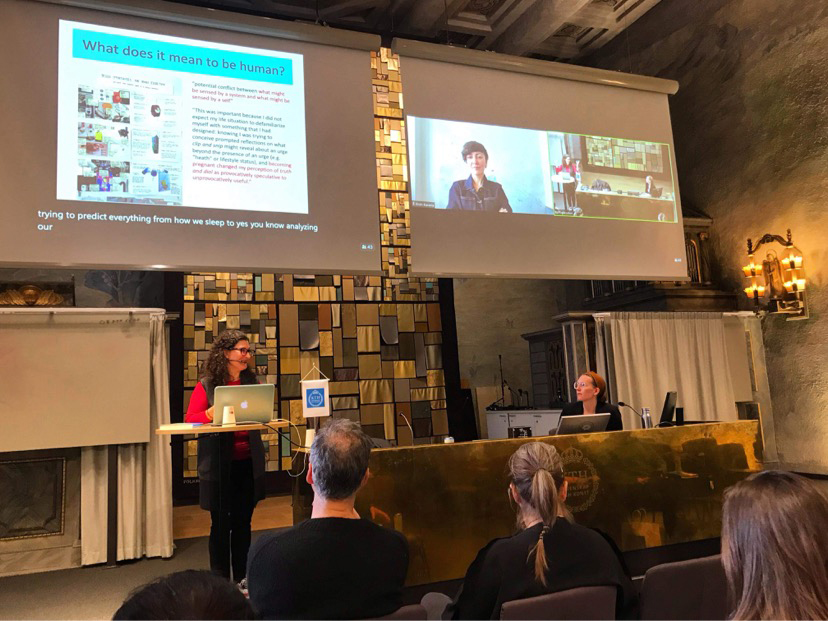
PhD defense!
On Feb 6th 13.00, I’ll be taking a brief intermission from parental leave 👶 to defend my thesis “Designing with care: Self-centered research for interaction design otherwise” ✨ Welcome to join: Kollegiesalen, Brinellvägen 8, Stockholm or on Zoom (https://kth-se.zoom.us/j/67699289253). Abstract below and PDF here!
Opponent: Laura Forlano
Committee: Danielle Wilde, Carl DiSalvo (virtual), Elvin Karana (virtual), Martin Avila
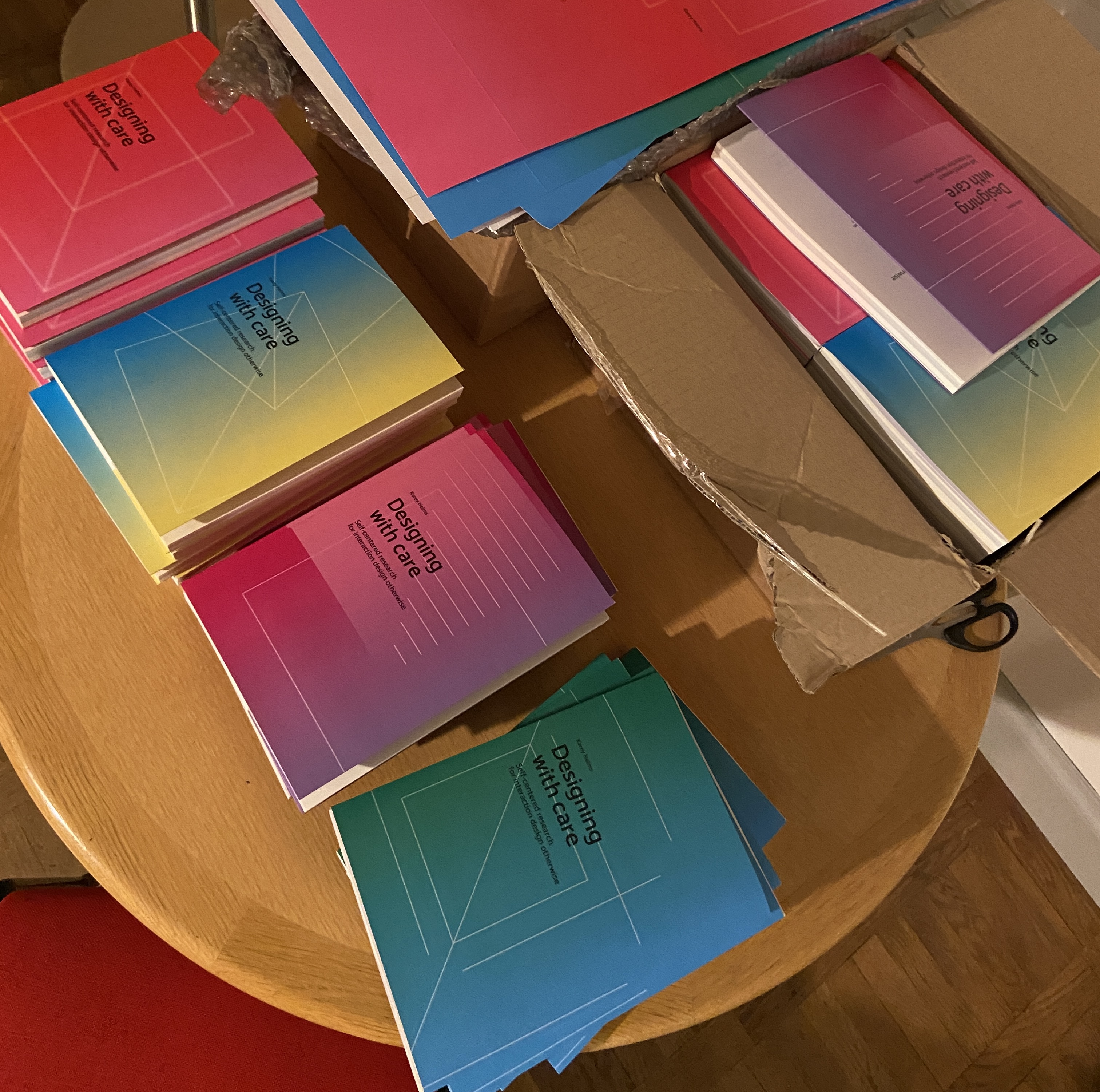
Designing with care: Self-centered research for interaction design otherwise
This dissertation is about the research program designing with care as a pathway towards interaction design otherwise amid a world in crisis. Considering how established ways of doing interaction design will change involves recognizing the role of digital materials in social injustice and systemic inequality. These concerns are inseparable from the material complexity of interactive experiences and their more-than-human entanglements in care. Through five design experiments, I explore everyday human care as wickedly attending to some care doings and not others, and an intimate and generous questioning of oneself as human.
I offer four contributions for interaction designers and design researchers. The first contribution is designing with care. This research program draws upon care ethics and posthumanism to establish four axioms: everyday, wickedness, intimacy, and generosity. Within this programmatic framework, the second contribution is definitions of wickedness and generosity as ethical stances that can be taken by designers and researchers. The third contribution is the synthesis of my four methodological approaches: auto-design, spatial orientations, leaky materials, and open speculations. Each is a generative and analytical pathway towards more sustainable and just futures. The fourth contribution is five careful designs as prototypes of what interaction design otherwise might be like: technologies of human waste, spying on loved ones, leaky breastfeeding bodies, scaling bodily fluids, and a speculative ethics.
From my research program and contributions, I discuss disciplinary resistances to suggest three possibilities for how I argue interaction design should change: engaging with mundane yet unrecognized topics, doing design work where the consequences would be present, and reconsidering how the formats of research publications could better reflect positionality. I then reflect upon the relevancy of self-centered research in moving beyond oneself for more sustainable worlds.
PhD 90% Seminar
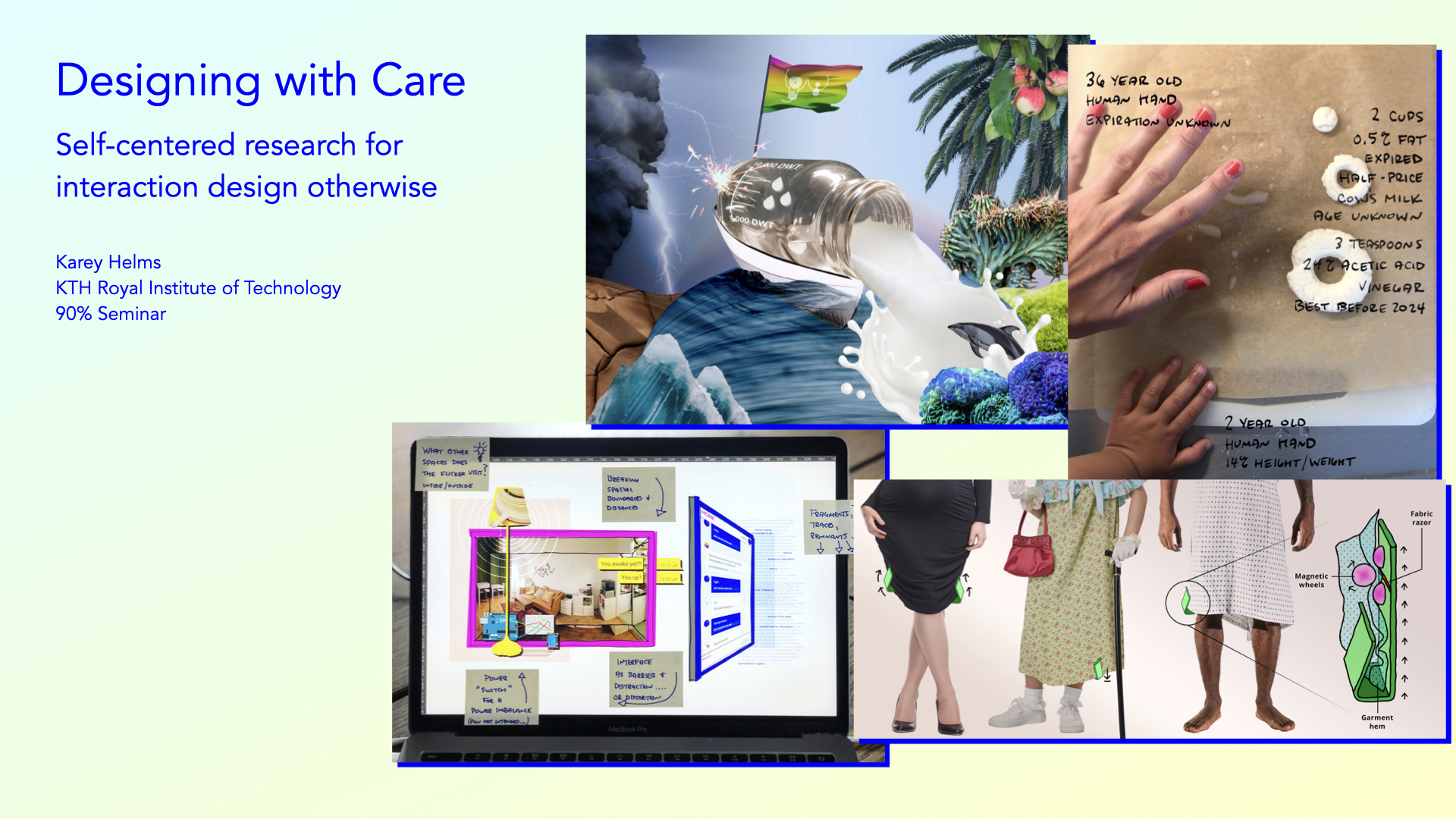
This week I had my 90% (“final”) seminar with Heather Wiltse from Umeå Institute of Design. I’m very appreciative of her engagement with my work and difficult questions that energized me for my next few months of writing. The tentative title and abstract of my thesis below:
Designing with care: Self-centered research for interaction design otherwise
This dissertation is about the research program designing with care as a pathway towards interaction design otherwise amid a world in crisis. Considering how established ways of doing interaction design will change involves recognizing the role of digital materials in social injustice and systemic inequality. These concerns are inseparable from the material complexity of interactive experiences and their entanglements in care. Through five design experiments, I explore wickedly attending to human everyday care, and an intimate and generous questioning of oneself.
I offer four contributions for interaction designers and design researchers. The main contribution is designing with care. Within this programmatic framework, I contribute extended articulations of wickedness and generosity. The third contribution is the synthesis of four methodological approaches: auto- design, spatial orientations, leaky materials, and open speculations. Each is a generative and analytical pathway towards five careful designs as prototypes of what interaction design otherwise might be like: technologies of human waste, spying on loved ones, leaky breastfeeding bodies, scaling bodily fluids, and a speculative ethics. From these, I discuss disciplinary resistances and personal struggles to reflect upon implicating oneself within more-than-human care, and consider the benefits and limitations of designing with care in moving beyond self-centered research towards more sustainable worlds.
DIS 2021 – Awards
This week I “presented” a full paper and pictorial at the 2021 ACM Designing Interactive Systems (DIS) conference – 10 minute pre-recorded video presentations below – and excited doesn’t quite capture how it feels to share that Entangled Reflections on Designing with Leaky Breastfeeding Bodies received a Special Recognition for Diversity & Inclusion, and Troubling Care: Four Orientations for Wickedness in Design received a Best Paper Honorable Mention Award.
Entangled Reflections on Designing with Leaky Breastfeeding Bodies, DIS 2021
Troubling Care: Four Orientations for Wickedness in Design, DIS 2021
KTH 2020 IxD Team Exhibition
A couple weeks ago, the Interaction Design team at KTH had an internal exhibition of design projects. Due to the pandemic, whereby we primarily work from home, it has been difficult to engage with each other’s design work. Thus, this exhibition was a chance for us to get together (in line with safe distancing) to share our work! I presented a new side project within my PhD that I started while on maternity leave last year, which I call Free the Nipple. Below are some images of my exhibition space and a draft project description. You can find more of the project’s process (and other project work) on my public instagram account.
PhD 50% Seminar
Last Wednesday I had my 50% PhD seminar! Sill processing the feedback from my opponent Lone Koefoed Hansen who Zoomed in from Aarhus University, but very thankful for an inspiring discussion.
A short overview of my research can be found here Careful Design: Implicit Interactions with Care, Taboo, and Humor. And an even shorter snapshot of 2.5 years in 16 seconds:
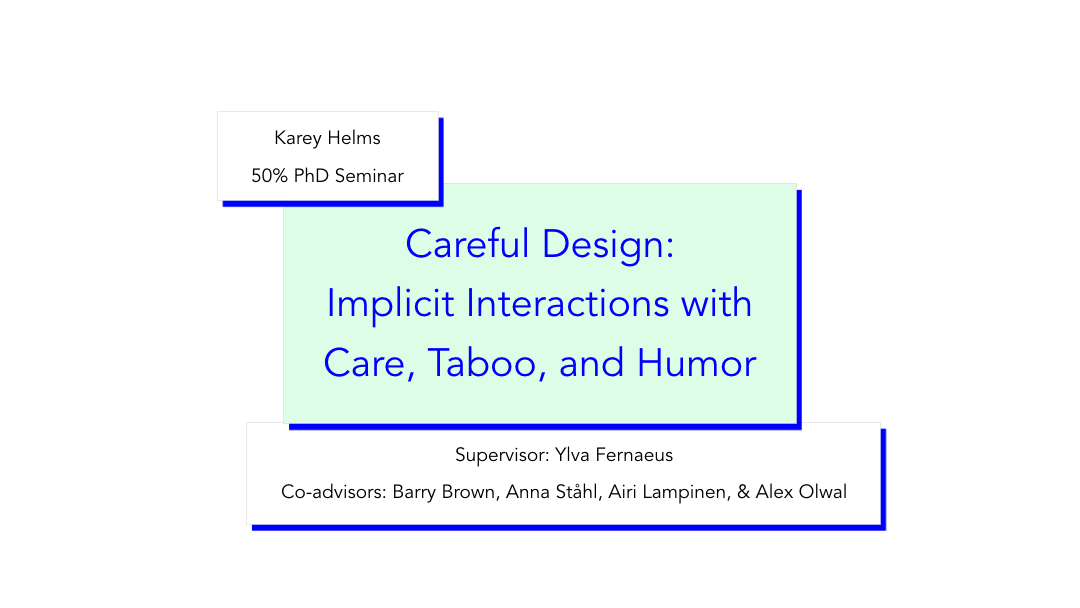
DIS 2020 – Accepted Doctoral Consortium Proposal
Having only recently returned to work full-time in March from ten months of parental leave, and despite working from home rather than in the lab due to COVID-19, it has felt wonderful to re-engage with my research with new energy and focus. Even more rewarding was to recently find out that my Doctoral Consortium proposal was accepted to DIS 2020. Very much looking forward to discussing my work with the Chairs and other participants – even if most likely virtual! Below is my title, abstract, and a link to the pre-print.
GROUP 2020 and CSCW 2019 – Accepted Papers
Very excited to have two papers accepted from an ongoing project on HCI and the outdoors with Airi Lampinen and Barry Brown from Stockholm University and Pedro Ferreira from IT-University of Copenhagen! Below are the abstracts, will post camera ready versions in the coming months. The first in particular and fieldwork that informed both are a precursor to upcoming design work that will ensue in the winter when I return from parental leave.
Away and (Dis)connection: Reconsidering the Use of Digital Technologies in Light of Long-term Outdoor Activities
Karey Helms, Pedro Ferreira, Barry Brown, Airi Lampinen. 2019. Away and (Dis)connection: Reconsidering the Use of Digital Technologies in Light of Long-term Outdoor Activities. ACM International Conference on Supporting Group Work (GROUP 2020), Sanibel Island, Florida, USA.
We present a study of long-term outdoor activities, based on altogether 34 interviews with 19 participants. Our goal was not only to explore these enjoyable experiences, but more broadly to examine how technology use was recontextualized ‘away’ from the everyday. Outdoor activities are commonly presented as an escape from our technology-infused world. In contrast, our interviews reveal experiences that are heavily dependent on technology, both digital and not. However, digital technology — and in particular the mobile phone — is reconfigured when taken out of its ordinary, often urban and indoor, context. We first present a diversity of ‘aways’ during outdoor activities by depicting cherished freedoms and interpersonal preferences. We then describe how participants managed connection and disconnection while away and upon coming back. To conclude, we discuss how constructions of away can support more purposeful engagements with digital technology, and how pointed (dis)connection can be useful for technology design also in non-outdoor settings.
From Nomadic Work to Nomadic Leisure Practice: A Study of Long-term Bike Touring
Pedro Ferreira, Airi Lampinen, Karey Helms, Barry Brown. 2019. From Nomadic Work to Nomadic Leisure Practice: A Study of Long-term Bike Touring. ACM Conference on Computer-Supported Cooperative Work and Social Computing (CSCW 2019), Austin, Texas, USA.
Mobility has long been a central concern in research within the Computer-Supported Cooperative Work (CSCW) community, particularly when it comes to work and how being on the move calls for reorganizing work practices. We expand this line of work with a focus on nomadic leisure practices. Based on interviews with eleven participants, we present a study that illuminates how digital technologies are used to shape and structure long-distance cycling. Our main analysis centers on bike touring as a nomadic leisure practice and on how it offers a radical departure from traditional modes of structuring work and life, and thus, complicates the relationship between work and leisure. We complement this with an account of managing the uncertainties of nomadicity by focusing on participants’ experiences with arranging overnighting and network hospitality. We offer this study, firstly, as one response to the call for more diversity in the empirical cases drawn upon in theorizing nomadic work and leisure practices, but more productively, as an opportunity to reflect upon the temporal and spatial logics of digital technologies and platforms and how they frame our attitudes towards the interplay between work and leisure.
DIS 2019 – Presentation and Slides
Today my paper Do you have to pee? A Design Space for Intimate and Somatic Data will be presented at DIS 2019 in San Diego by a colleague from KTH as I am currently on parental leave with my four week old daughter. Would love to be at the conference presenting and discussing this work, but am more grateful for the conference’s flexibility and Vasiliki Tsaknaki’s assistance in the presentation of this paper while I am instead home in Sweden!
Since this research includes an autobiographic approach and a reflection on my positionality as a design researcher, both of which are critical to the work, the presentation I prepared included both video and audio recording of myself intermixed among a script for Vasiliki (which is why the script includes a mix of first and third person). It was definitely a new challenge rethinking how to make a presentation that included my own voice while using my colleague’s presence for audience engagement! Below is the full written script and slides, and the full paper (which won an honorable mention award!) is available here.
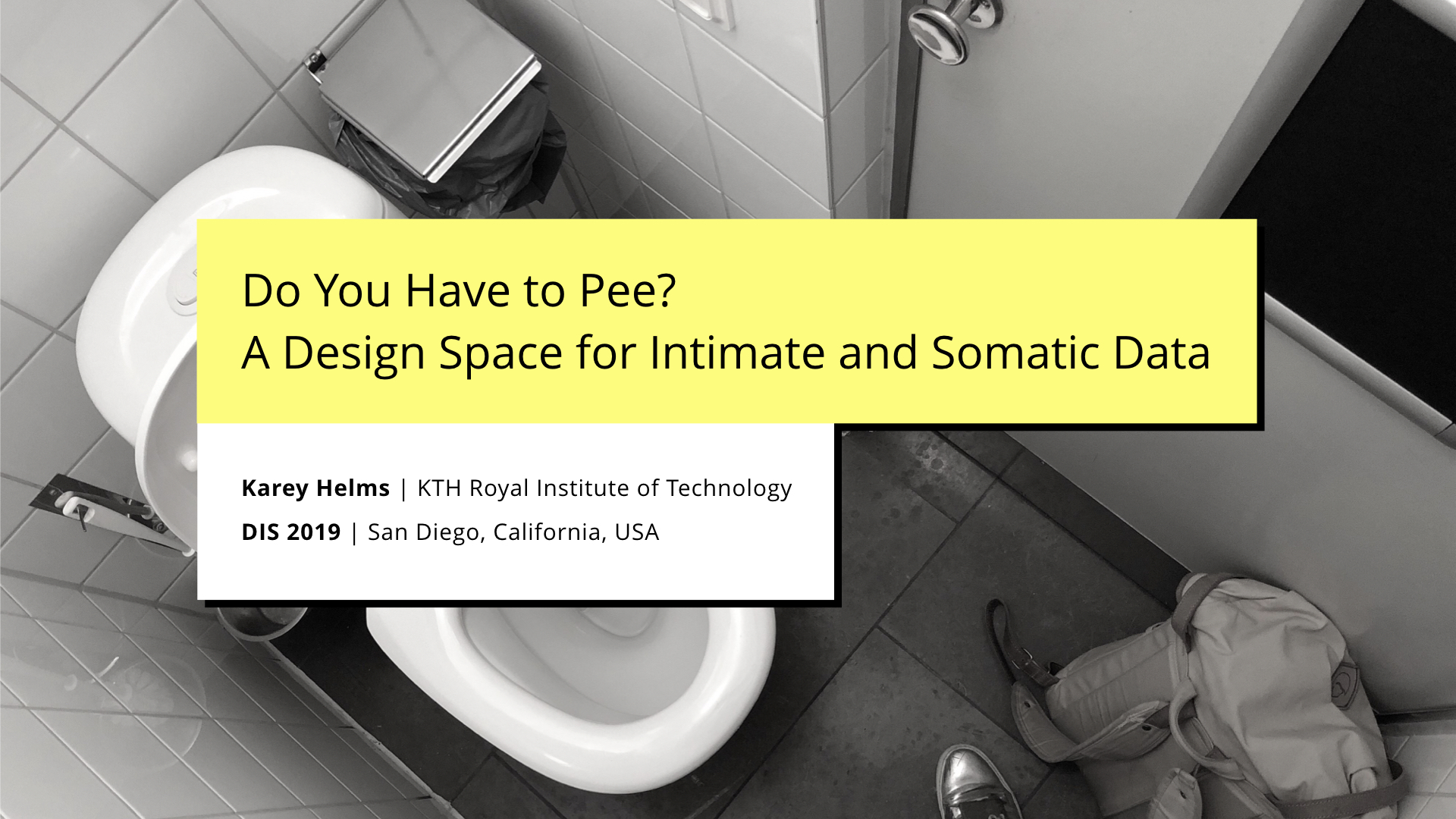
DIS 2019 – Accepted Paper
Couldn’t be more please to find out today that I have a full paper accepted to DIS 2019! Very thankful for my amazing colleagues who provided invaluable support for and feedback on the paper.
Below is the title and abstract, will post a camera ready version in the coming weeks.
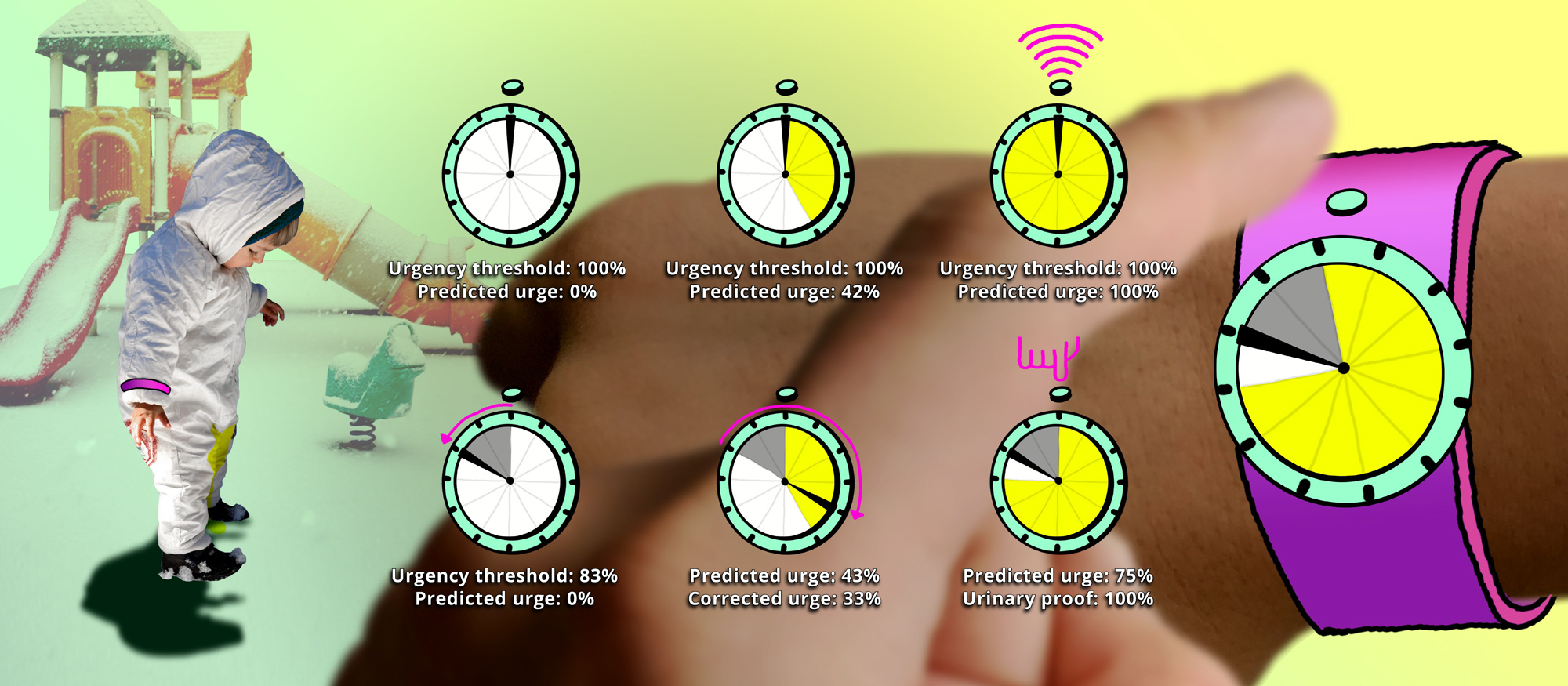
Do you have to pee? A Design Space for Intimate and Somatic Data
The management of bodily excretion is an everyday biological function necessary for our physiological and psychological well-being. In this paper, I investigate interaction design opportunities for and implications of leveraging intimate and somatic data to manage urination. This is done by detailing a design space that includes (1) a critique of market exemplars, (2) three conceptual design provocations, and (3) autobiographical data-gathering and labeling from excretion routines. To conclude, considerations within the labeling of somatic data, the actuating of bodily experiences, and the scaling of intimate interactions are contributed for designers who develop data-driven technology for intimate and somatic settings.
KTH 2018 PhD Supervisory Panel
Today was our department’s annual PhD Supervisory Panel at KTH during which PhD students are given the opportunity to get feedback from senior researchers who act as “guest supervisors.” To prepare for my meeting with two Associate Professors I reworked my research abstract and research questions following my 30% seminar in October, during which Johan Redström from Umeå Institute of Design acted as my discussant. My goals in today’s supervisory panel were to get feedback on the new scope of my abstract and research questions relative to being only about 40% through my PhD (and I’m sure will continue to evolve), and identify important areas that I need to work on articulating to more firmly position my research in the context of how I am conceptually “furnishing” my design space. Considering I was presenting to senior researchers from different academic backgrounds than my own and each other, it was especially helpful to see within which aspect I felt misunderstood, i.e. where I need to sharpen my arguments. Below my poster summarizing my research thus far, followed by a few notes/reflections based on feedback received today, and a textual version of my abstract and research questions.
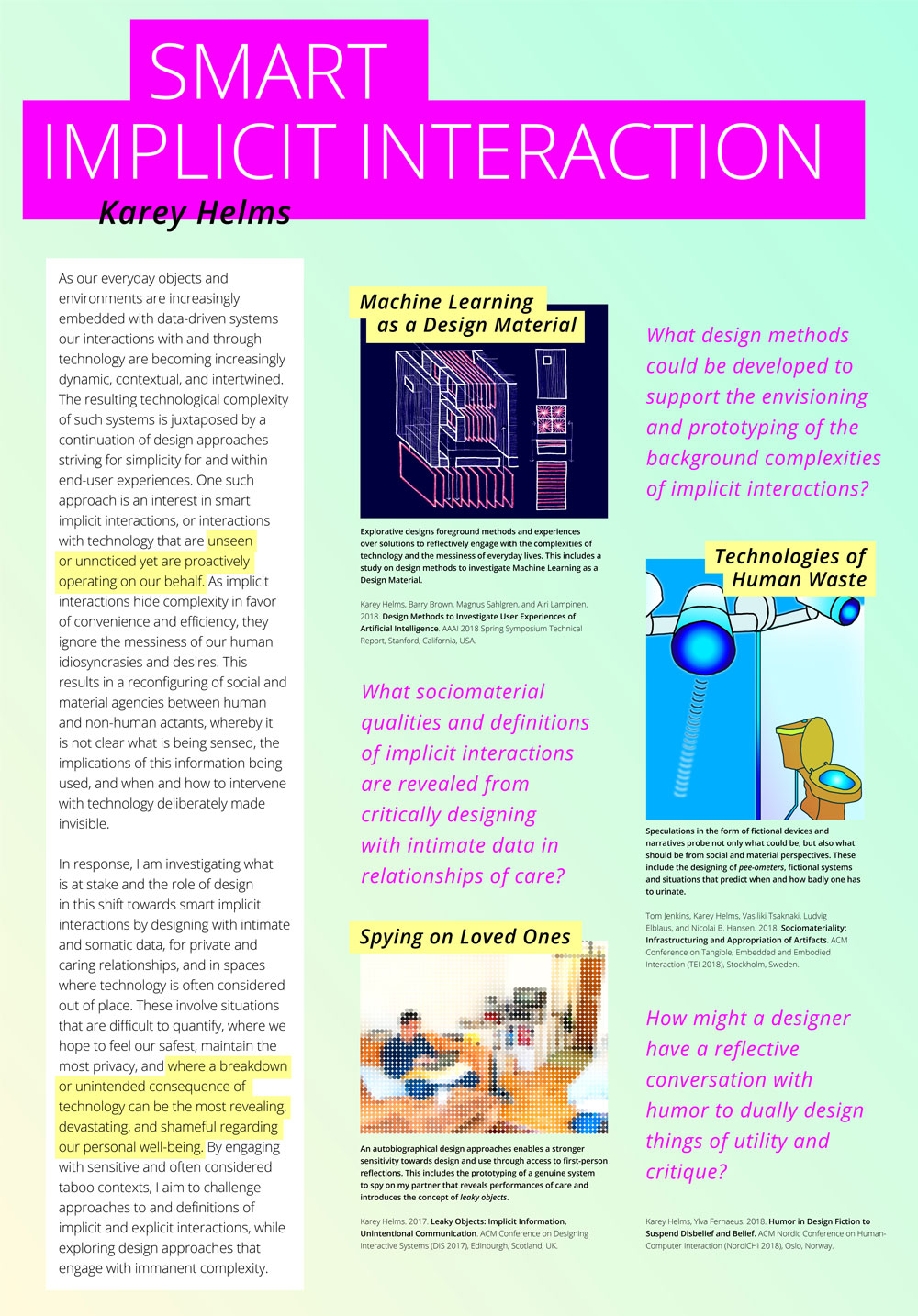
NordiCHI 2018 – Presentation & Slides
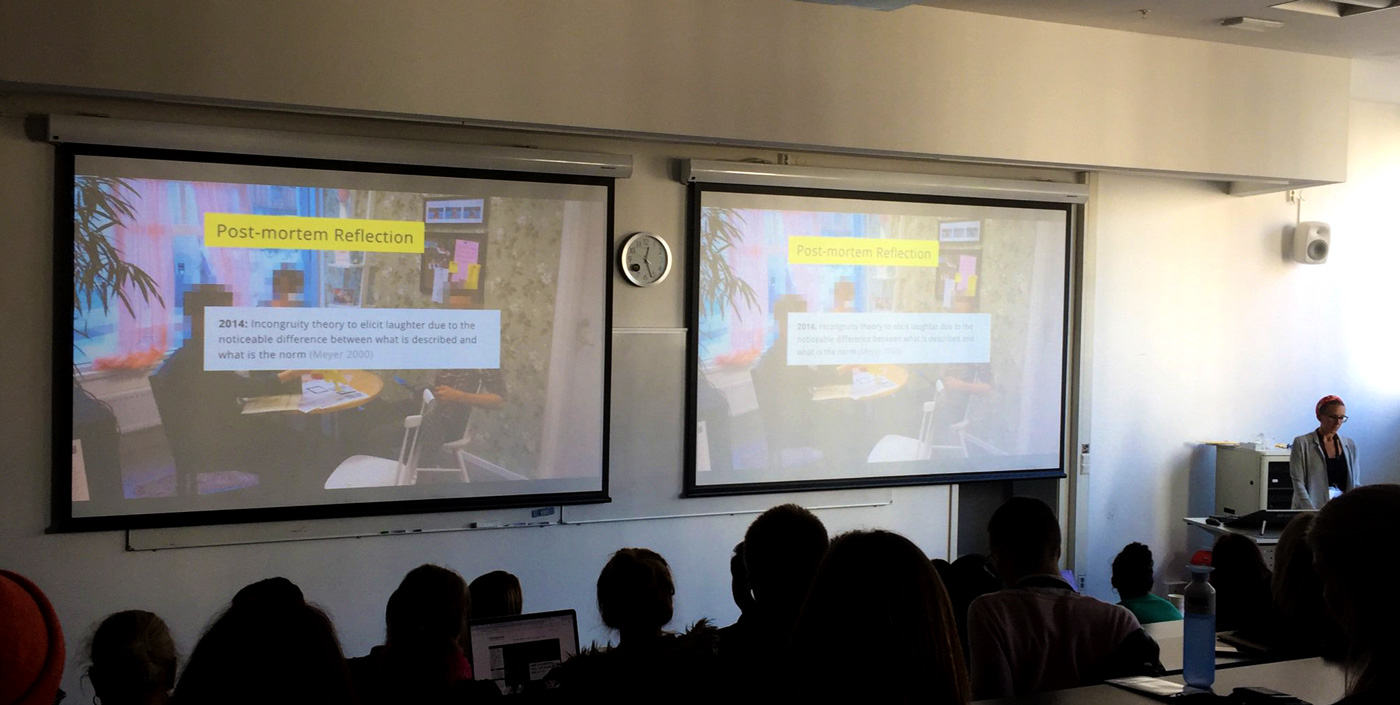
Early this week I presented a paper written with my PhD supervisor Ylva Fernaeus on the use of Humor in Design Fiction to Suspend Disbelief and Belief at NordiCHI 2018 in Oslo. This paper was part of the future scenarios track at NordiCHI, an excellent initiative and venue that explores the design of design fictions. Our paper contributed (1) a way in which humor might be used in design fiction (and design more broadly), (2) a design process that includes fieldwork to inform the design of design fictions, (3) and a human-scale design fiction as a method of communication and dissemination. For the presentation, I originally intended to role-play the paper presentation as a character from the fictional world, as I did when presenting the same project four years ago in Umeå as my master’s thesis, but last minute opted to not because of the opening introductions by moderators. Instead, I opened the presentation by jumping into the fiction with no context, and then gradually introduced more information and built reflections throughout the remaining of the presentation. I think this structure worked very well. The full paper is available here and the presentation below.
NordiCHI 2018 – Accepted Paper (Future Scenarios)
Very excited to have a NordiCHI 2018 paper accepted in the future scenarios track! Written with Ylva Fernaues, my supervisor at KTH, the paper is about why and how I used humor in my MFA thesis at Umeå Institute of Design four years ago.
Karey Helms, Ylva Fernaeus. 2018. Humor in Design Fiction to Suspend Disbelief and Belief. ACM Nordic Conference on Human-Computer Interaction (NordiCHI 2018), Oslo, Norway.
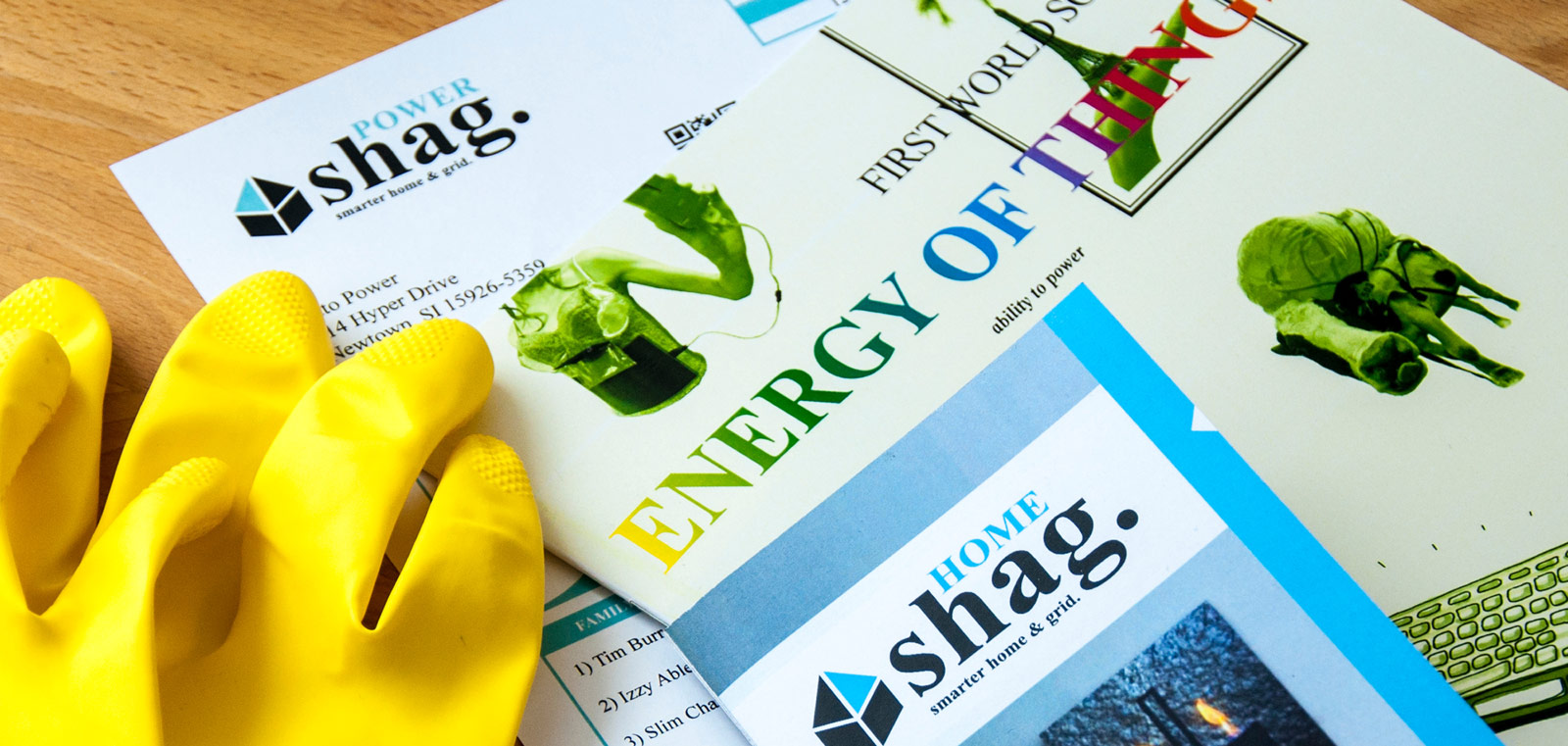
Humor in Design Fiction to Suspend Disbelief and Belief
This paper investigates humor as a resource and strategy for design with discourse as an intended outcome. While humor can incite empathy and understanding, it can also lead to alienation and disengagement. Through the detailing of the pre-narrative and narrative processes of an exemplar design fiction we describe why and how elements of humor, in particular puns, parody, and pastiche, were employed. Following the presentation of the fiction and its use in the design of an exhibition and diegetic prototypes, the paper presents responses from participants and audience members to reflect upon how humor was received within the design fiction. Following these reflections, as the near-future scenario was written four years prior to this paper and is now situated within present-day, it then concludes with a post-mortem reflection on the floating nature of humor.
UBISS 2018 – Humanistic HCI
Two weeks ago I spent a week in northern Finland at Oulu University for a workshop (UBISS summer school) on Humanistic HCI, lead by Jeffrey and Shaowen Bardzell from Indiana University. The workshop was structure around a curated reading list that included a book on Humanistic HCI, and covered aesthetic experiences, emancipatory approaches, and critical-interpretative methodologies applied towards HCI. In addition to reading seminars, we also carried out small group projects during which we applied humanistic epistemologies to shared research domains. It was an incredible (and exhausting!) experience, both this particular workshop I participated in and the summer school as a whole!
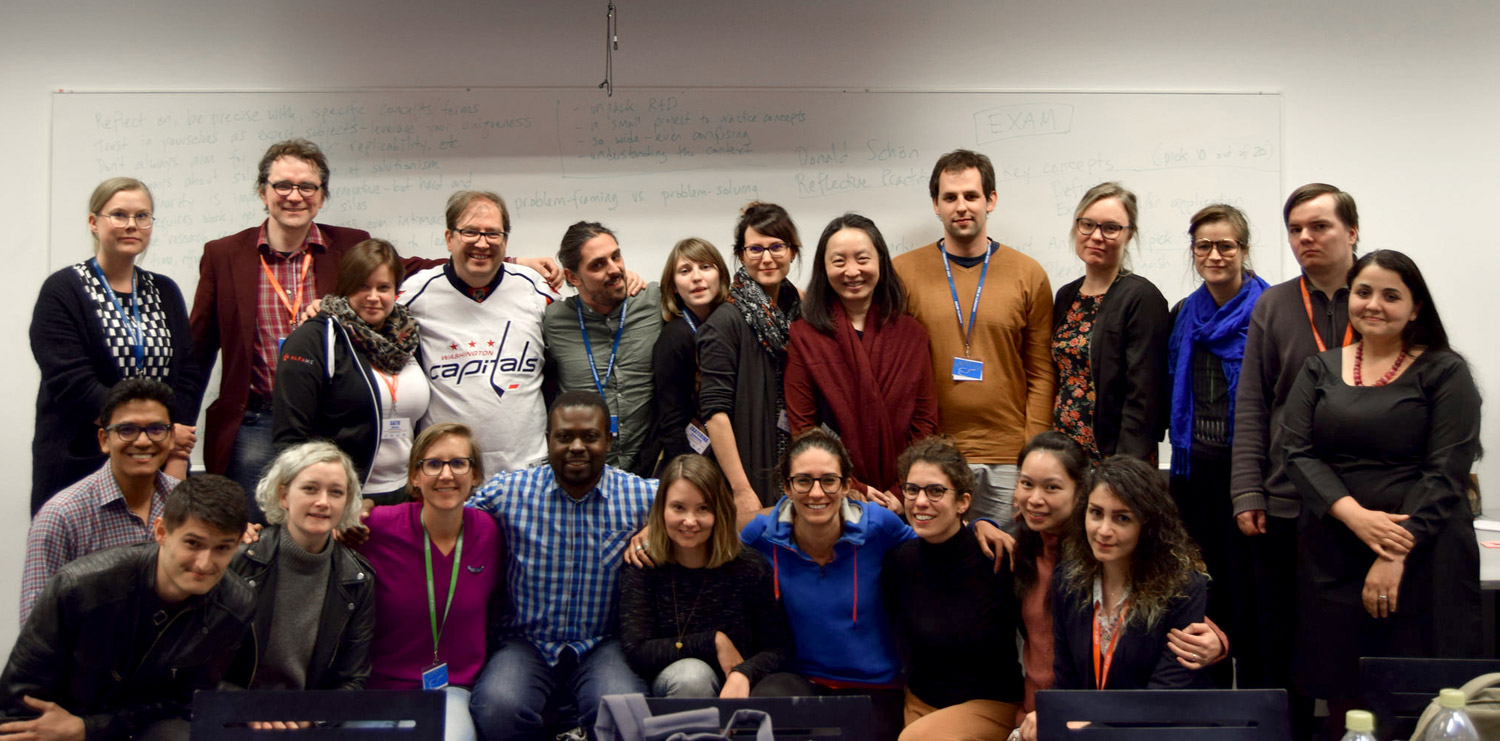
AAAI 2018 – Presentation & Slides
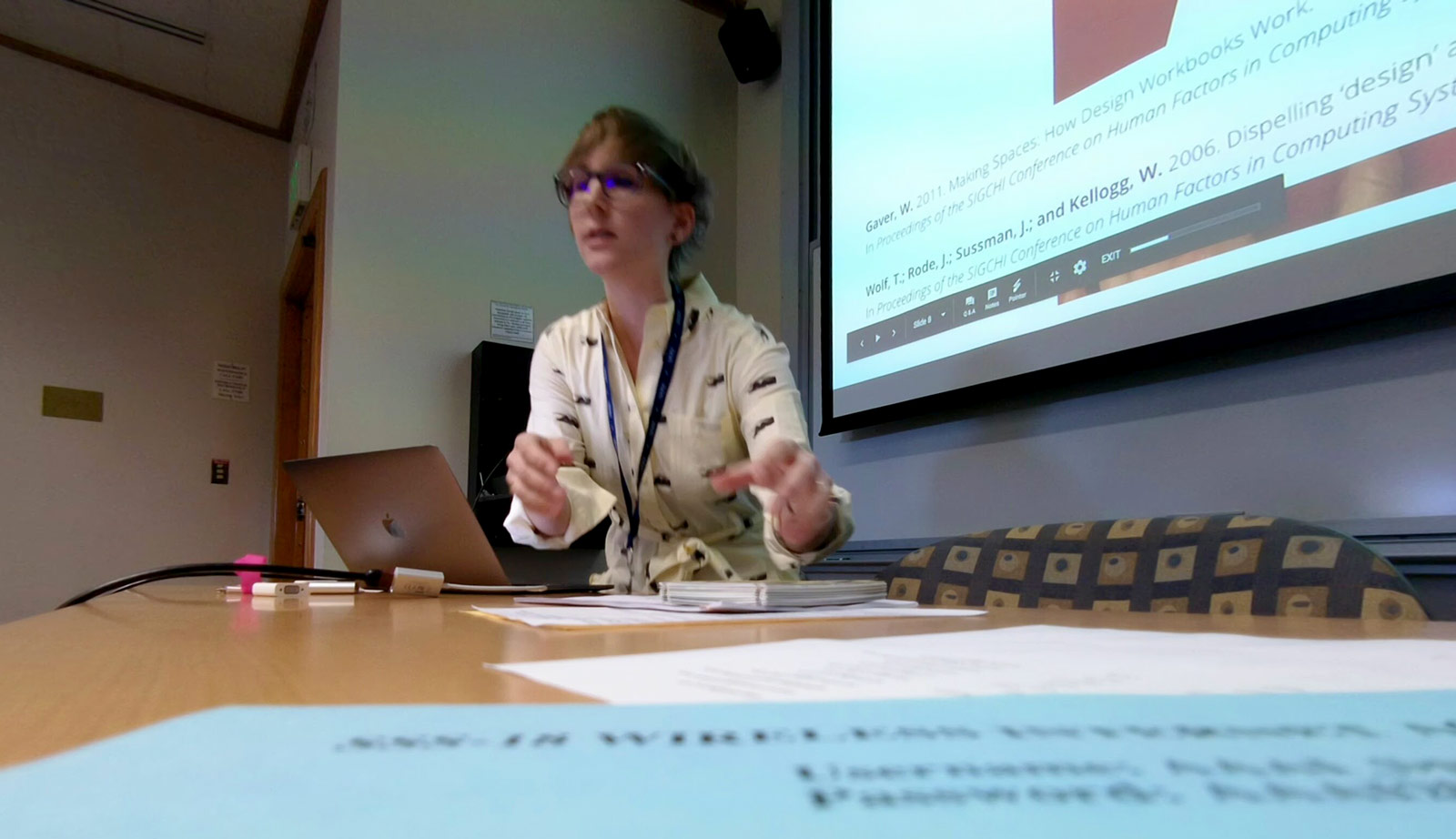
Last week I presented my paper Design Methods to Investigate User Experiences of Artificial Intelligence at the 2018 AAAI Spring Symposium on the User Experiences of Artificial Intelligence. The picture above was taken by a Google Clips camera, which was also one of the presented papers. Below are my slides, which contain supplementary images to my paper on the three design methods I have engaged with relative to the UX of AI. Another blog post will soon follow with reflections on other papers presented.
CHI 2018 – Attending Workshop on HCI Outdoors
This year I’ll be going to CHI 2018 as a student volunteer and to attend the workshop HCI Outdoors: Understanding Human-Computer Interaction in the Outdoors. Very much looking forward to connecting with the HCI outdoors community for a new research project!

A Walk in the Woods: Gear and Infrastructure in the Outdoors (position paper PDF)
In this position paper, we describe an initial research activity, a short walk in the woods, to position our interest in HCI and the outdoors. We present three preliminary reflections from our hike on relationships with gear and infrastructure that enable meaningful outdoor experiences. These include parallels between packing gear and preparing devices, contrasting notions within bodily comfort and brand allegiance, and safety bubbles enabled by actual or expected infrastructures.
AAAI 2018 – Accepted Spring Symposia Papers
Two papers were accepted to the AAAI 2018 Spring Symposia: Design Methods to Investigate User Experiences of Artificial Intelligence for The UX of AI symposium and The Smart Data Layer for Artificial Intelligence for the Internet of Everything symposium. I’ll be presenting the former at Stanford at the end of March, bellow is the abstract.
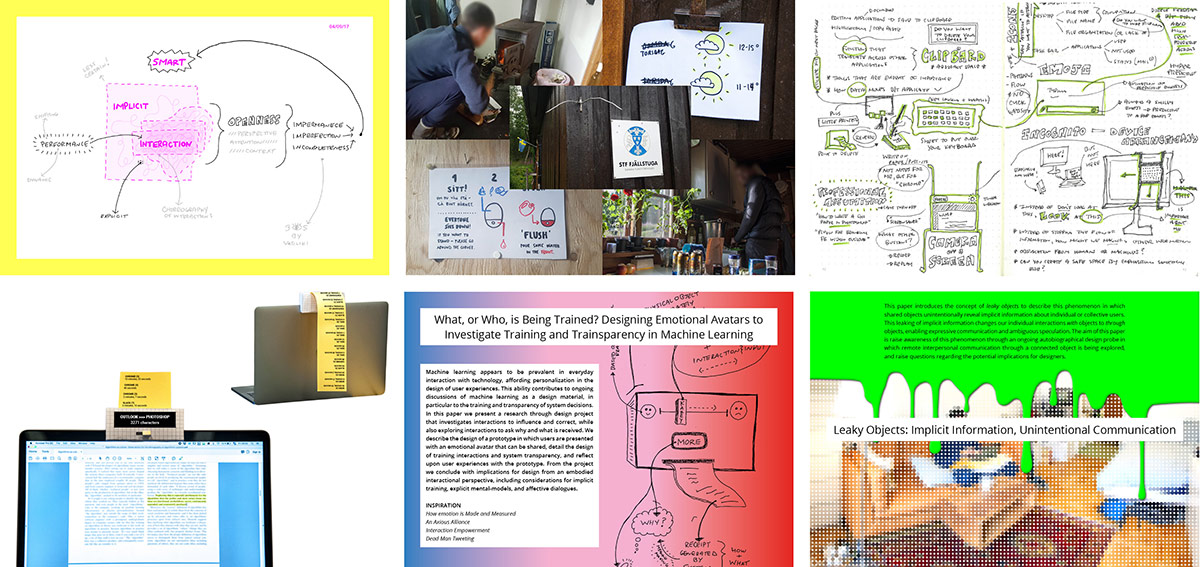
Design Methods to Investigate User Experiences of Artificial Intelligence
This paper engages with the challenges of designing ‘implicit interaction’, systems (or system features) in which actions are not actively guided or chosen by users but instead come from inference driven system activity. We discuss the difficulty of designing for such systems and outline three Research through Design approaches we have engaged with – first, creating a design workbook for implicit interaction, second, a workshop on designing with data that subverted the usual relationship with data, and lastly, an exploration of how a computer science notion, ‘leaky abstraction’, could be in turn misinterpreted to imagine new system uses and activities. Together these design activities outline some inventive new ways of designing User Experiences of Artificial Intelligence.
PhD’ing – Writers’ Retreat, Project Offsite, Outdoors Research, and Making Preciousness
Today I saw a meme on Instagram which said, “We are now entering the third month of January.” I couldn’t relate more! And looking back over the past few weeks, cannot believe all that has already happened in 2018.
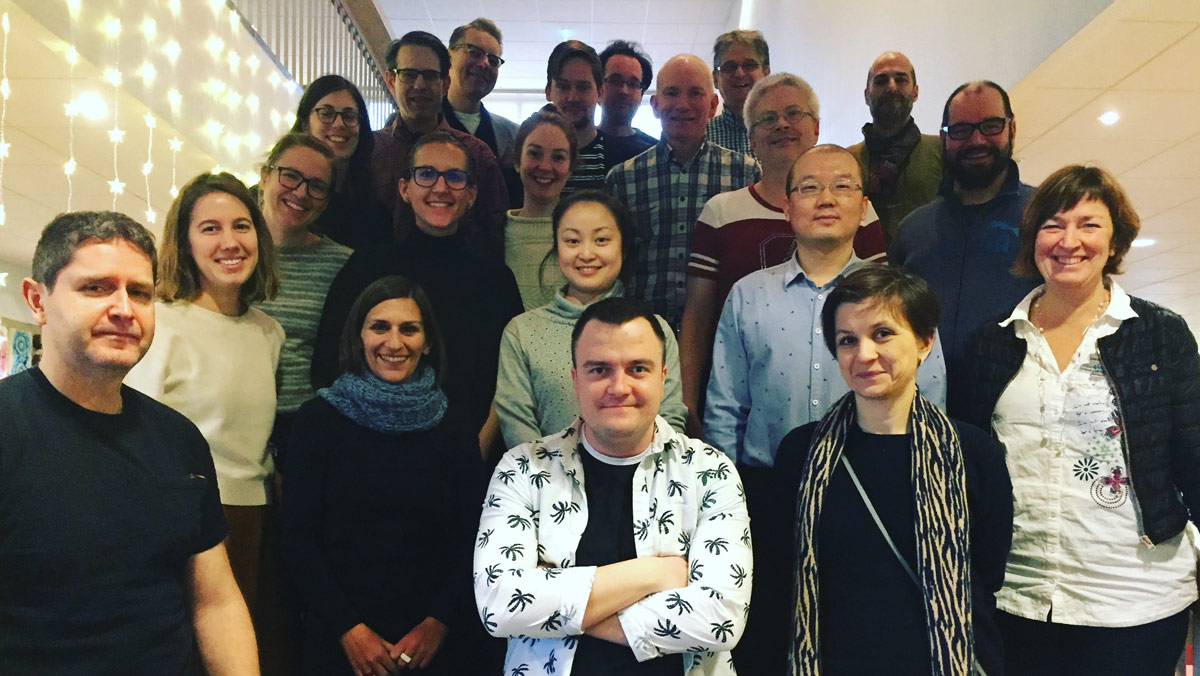
Writer’s Retreat
Following a paper deadline in early January, my department at KTH (Media Technology and Interaction Design) kicked off 2018 with a writers’ retreat. What happens at a writers’ retreat? We book a venue in the Stockholm archipelago for three days and two nights, and write. And sauna and winter swim, but mainly write. The primary purpose of the retreat is to provide time and space away from everyday academic duties, from teaching to admin responsibilities, in order to focus on increasing the quality and quantity of our writing output. During the three days, we follow an agile framework in which junior/senior pairs write in ~45 minute sprints and then provide ~15 minutes of feedback. In addition to intense writing blocks, lunches, dinners, and evening activities provide ample opportunities to better know our colleagues professionally and personally. Though equally as exhausting as the writing, this social time I find incredibly valuable in creating a continued collaborative culture at work.
During this year’s writing camp I started a paper on a Pee-ometer, a recent project by Master’s students that I proposed and supervised in which they prototyped a wearable device that predicts when a user has to pee to investigate Machine Learning as a design material.
Project Offsite
In mid January, the Smart Implicit Interaction project had a two day project offsite. As the project is composed of differing philosophical and methodological backgrounds – i.e. Artificial Intelligence, Social Sciences, and Interaction Design – the first day consisted of a beginners overview into reinforcement and representational learning in neural networks to introduce technical terminology and objectives. During the second day, all of the sub-projects presented their current status and goals for the year. I specifically presented two ongoing design projects, data-driven design methods and the Pee-ometer. In the former, I discussed early design activities and resulting concepts from investigating the implications of screenshots as a data source. In the latter, I discussed three high-level interests guiding future project directions, including Machine Learning as a design material, interactional loops, and critique and ethics. Overall, it was inspiring to share and strategize better collaborations while revisiting overarching project objectives.
Project Offsite
Last week continued January’s streak of out-of-office research activities and into the forest. To kick off an new outdoors project, myself and three senior researchers went on a mid-week day hike 30 minutes outside of Stockholm. Not only was I surprised at a Professor’s ability to make a fire in the snow, but the excursion was both refreshing and constructive. More in the coming months!
Making Preciousness
And last but definitely not least, friend and fellow PhD student Vasiliki successfully defended her thesis Making Preciousness: Interaction Design Through Studio Crafts. Her opponent Ron Wakkary gave a much deserved brilliant presentation of her work before lengthy discussions with him and the committee. Admittedly, it is selfishly bittersweet to see her finishing as she has been a tremendous support and inspiration during the first year of my own PhD.
TEI 2018 – Studio Call for Participation
Sociomateriality: Infrastructuring and Appropriation of Artifacts
Novel materials and innovative applications can sometimes outweigh a reflective perspective on the roles that objects and materials can play in social life. In this Studio, we want to bring together researchers and practitioners who are interested in exploring design outcomes from a sociomaterial perspective. By having prototypes at the center of the Studio activities, we intend to create prompted speculative fictions that link the material outcomes of design practice to social agency and cultural effects.
This studio will offer an opportunity to examine how objects might participate in social spheres as well as act as material bridges to their design process. We will do this through both hands-on examination of design objects, and inquiry into the infrastructuring and appropriation of these artifacts. The themes that will be examined are agency, material participation, and cultural performance of things. We encourage participants to bring their own prototypes.
We invite scholars and design practitioners from a variety of fields to register on the TEI 2018 website. For any questions, email the workshop organizers at mailto:hello@sociomaterial-things.com.
For any questions, email the workshop organizers at:
mailto:hello@sociomaterial-things.com.
More information you can find at the Studio webpage:
http://sociomaterial-things.com
Organizers
Tom Jenkins – Georgia Institute of Technology
Vasiliki Tsaknaki – KTH Royal Institute of Technology
Karey Helms – KTH Royal Institute of Technology
Ludvig Elblaus – KTH Royal Institute of Technology
Nicolai Brodersen Hansen – TU Eindhoven